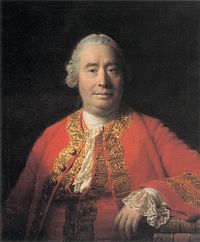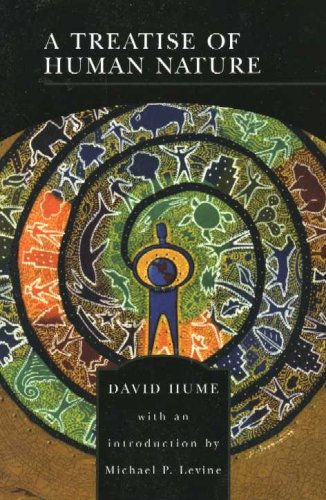 |
| David Hume |
Key: IN: Interviewer
DH: David Hume (1711-1776)
IN: Tonight we will be talking with British empiricist, David Hume! Would you care explaining what empiricism is to my audience?
DH: Empiricism is a theory of knowledge that asserts that knowledge comes only or primarily from sensory experience. When I say sensory experience, I mean believing of your actual observations without regard to what your religion or your politics say you should believe.
IN: Well what happens to those who never get a chance to experience the world? Should they not rely on their religious and political beliefs? Would that make them naive?
DH: If a person does not get to experience the world, they are already naive. You have no true knowledge if you have no true experience.
 |
| Treatise of Human Nature |
DH: The 1st book, Understanding, deals with the human cognition. Possibly the two biggest parts are the Nature of Ideas and the Ideas of Space and Time. The Nature of Ideas divides all perception into ideas and impressions. Simple impressions cause simple ideas, and from simple ideas form complex ideas, either to the same order of complex impressions, memories, or re-arranged in a new form, imagination. General ideas are nothing but ideas attached to recall other individuals or objects already tied to that idea. There is one simple reason why this is: the mind cannot think of a certain quality without the degree of that quality, such as a line without knowing how long it is. All ideas must have their particular degrees of qualities before the mind can process it. The Ideas of Space and Time argues that our ideas of space and time aren't divisible because the capacity of the mind is limited. The mind cannot perceive an object with an infinite number of parts therefore time and space cannot be infinitely divided.
IN: The other two book are of Passions and of Morals. What are those briefly about?
 |
| An Enquiry Concerning the Principles of Morals |
IN: How do you feel about the initial rejection of the Treatise?
| An Enquiry Concerning the Human Understanding |
IN: It's been a pleasure talking with you tonight Mr. Hume. Please go check out his books today!
David Hume, one of my favorite philosophers. A guy who knew how to think, but also when to stop and go play pool or visit the pub. I'm going to teach a whole course on him one of these days.
ReplyDelete